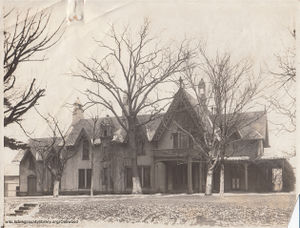Difference between revisions of "Oakwood"
(Created page with "Oakwood, commonly known today as the Penney Mansion, is a Gothic-Revival style home built between 1849 and 1851. The style of the home is referred to as a “Downing Cottage,...") |
|||
| Line 1: | Line 1: | ||
| − | Oakwood, commonly known today as the Penney Mansion, is a Gothic-Revival style home built between 1849 and 1851. The style of the home is referred to as a “Downing Cottage,” meaning its design was inspired by the work of Andrew Jackson Downing.<ref>Marguerite J. McCollum, “Two Newark Homes Exemplify Character of Downing Style of Early American ‘Cottage’,” ''The Newark Advocate American Tribune'', March 31, 1939. </ref> The house was built by George Washington Penney as a home for his wife Romina and their children. Oakwood originally sat on a two-hundred-acre farm in what is now the east end of Newark.<ref>Nina Kosher, “Story of Oakwood Recalls Romance of Times Past,” ''The Advocate'', April 1, 1984, 2D.</ref> The house is still standing and sits on what is now Penney Avenue. | + | [[File:wiki_oakwood.jpg|thumb|alt= A photo of Oakwood.|Oakwood, as it appeared in the 1930s. Photo from the archives of the [[Licking County Historical Society]].]]Oakwood, commonly known today as the Penney Mansion, is a Gothic-Revival style home built between 1849 and 1851. The style of the home is referred to as a “Downing Cottage,” meaning its design was inspired by the work of Andrew Jackson Downing.<ref>Marguerite J. McCollum, “Two Newark Homes Exemplify Character of Downing Style of Early American ‘Cottage’,” ''The Newark Advocate American Tribune'', March 31, 1939. </ref> The house was built by George Washington Penney as a home for his wife Romina and their children. Oakwood originally sat on a two-hundred-acre farm in what is now the east end of Newark.<ref>Nina Kosher, “Story of Oakwood Recalls Romance of Times Past,” ''The Advocate'', April 1, 1984, 2D.</ref> The house is still standing and sits on what is now Penney Avenue. |
Oakwood was inspired by Downing’s designs, but it was constructed from a watercolor design created by another famous designer, Alexander Davis. The original watercolor by Davis that inspired the design of the home is held at the Metropolitan Museum of Art in New York City.<ref>Kosher, “Story of Oakwood Recalls Romance of Times Past.”</ref> | Oakwood was inspired by Downing’s designs, but it was constructed from a watercolor design created by another famous designer, Alexander Davis. The original watercolor by Davis that inspired the design of the home is held at the Metropolitan Museum of Art in New York City.<ref>Kosher, “Story of Oakwood Recalls Romance of Times Past.”</ref> | ||
Revision as of 06:44, 7 May 2019

Oakwood was inspired by Downing’s designs, but it was constructed from a watercolor design created by another famous designer, Alexander Davis. The original watercolor by Davis that inspired the design of the home is held at the Metropolitan Museum of Art in New York City.[3]
The home is built from bricks that were fired on the property and is covered in buttermilk stucco. It also holds the distinction of having the first bathtub in central Ohio.[4] Oakwood was a gathering place of Licking County’s social elite throughout the second half of the nineteenth century. It was furnished with European furniture, housed rare paintings, and featured an imported Venetian glass chandelier.[5]
In the years following the Civil War, the Penney family fell on hard financial times. They were forced to live off of their land, growing their own food and selling cream from their cows to make extra money. The family began selling off some of their land, part of which was sold to the A.H. Heisey Company for the creation of the Heisey factory. Eventually the farm became entirely included within Newark’s city limits, causing the property taxes to rise above the family’s means. At that point, Oakwood was sold by George and Romina’s daughter Ermina.[6] The Penney family occupied the home until around 1900.[7]
C.S.
References
- ↑ Marguerite J. McCollum, “Two Newark Homes Exemplify Character of Downing Style of Early American ‘Cottage’,” The Newark Advocate American Tribune, March 31, 1939.
- ↑ Nina Kosher, “Story of Oakwood Recalls Romance of Times Past,” The Advocate, April 1, 1984, 2D.
- ↑ Kosher, “Story of Oakwood Recalls Romance of Times Past.”
- ↑ Kosher, “Story of Oakwood Recalls Romance of Times Past.”
- ↑ Florence M. King, “Penney Mansion, ‘Oakwood,’ Was Center of Social Activity Two Generations Ago,” The Newark Advocate, April 7, 1938.
- ↑ Kosher, “Story of Oakwood Recalls Romance of Times Past.”
- ↑ McCollum, “Two Newark Homes Exemplify Character of Downing Style of Early American ‘Cottage’.”